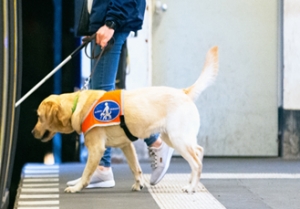Kyle Wood, a man with Down's Syndrome, moved from South Africa to the UK in 2019, seeking better job opportunities. Since September, he has been working at a diner in Faringdon, Oxfordshire. While only 4.8% of adults with learning disabilities and autism are employed in the UK, this is still higher than South Africa’s 1% rate for disabled individuals. Kyle's job has provided him with new skills and a sense of community.
Kyle trained for 18 months with Yellow Submarine, an Oxfordshire-based charity that supports disabled individuals in finding employment. After graduating, the charity helped him secure a job and continues to provide support. The charity emphasises helping trainees maintain long-term employment through simple workplace adaptations.
Rachael Blakey, Yellow Submarine’s adults’ programmes manager, mentioned employers' concerns about costs and adjusting. To address these issues, the government launched the Disability Confident Scheme in 2016 to encourage businesses to hire and retain disabled employees. Currently, 19,638 UK employers are signed up to the initiative.
A Department for Work and Pensions spokesperson stated that the Disability Confident Scheme aims to challenge perceptions and support businesses in hiring disabled individuals. An independent 2022 survey found that about two-thirds of employers had hired a disabled employee since joining the scheme, and more than four in five offered workplace adjustments.
An autistic girl from Derby, who often ran away and put herself in danger, has had her life transformed by an assistance dog. Eight-year-old Alessa, diagnosed with autism age five, frequently bolted from her family. After a close call where she was hit by a car, her parents sought additional support.
"If there was an open door, she'd be gone—she was constantly on the go," said Donna, Alessa’s mother and Clinical Support Worker. "She ran across the road to see her grandad's van and was hit by a car. Thankfully, the driver braked just in time, but it was a close call that left us all shaken."
Mandy, a Labrador-Golden Retriever, trained by the National Charity of Support Dogs, has dramatically improved Alessa's behaviour. Research by Autism Speaks indicates nearly half of autistic children are prone to bolting or wandering. Since Mandy joined their family, Alessa has almost stopped running away. "When Alessa is upset, Mandy just sits with her, and she calms down. Mandy is her rock," Donna noted. "Before, she would throw things, scream, shout, and kick."
During lockdown in 2021, Donna applied for an assistance dog, and within a year, a match was found. When Mandy met Alessa, their connection was immediate. "As soon as Mandy sat with her, Alessa just chilled. It was amazing to watch." Mandy has not only brought calm to Alessa but also brought the family closer together.
A new report from Newlife (a charity for Disabled Children) reveals that the basic needs of disabled children are not being met, with three in five families unable to access essential specialised equipment. Waiting times are rising, with nearly one in four local authorities having waitlists of at least a year, some extending beyond three years.
Specialised equipment is crucial for the 1.6 million disabled children in the UK, a number that has doubled in the past decade. Both families and professionals are concerned about inadequate provision, with 75% of professionals blaming funding and staff shortages for the delays.
Regions like the Northwest of England face the longest waits, exceeding three years in some cases, followed by Northern Ireland, Wales, and London. The report identifies key barriers: long assessment waits, insufficient budgets, lack of government leadership, and staff shortages.
Newlife has called for a dedicated Minister for Disabled Children to address these issues by accelerating equipment provision, reducing assessment waits, and tackling staff shortages. The charity has also urged for clearer guidance for local services, expansion of the paediatric apprenticeship programme, improved staff retention and training, maximum wait times for assessments, and a ringfenced budget for equipment.










